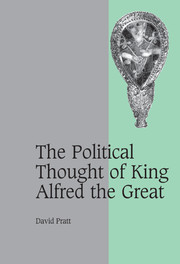Book contents
- Frontmatter
- Contents
- Acknowledgements
- List of abbreviations
- Note on citations
- Chapter 1 INTRODUCTION
- Part I The West Saxon Political Order
- Chapter 2 RESOURCES AND EXTRACTION
- Chapter 3 ROYAL LORDSHIP AND SECULAR OFFICE-HOLDING
- Chapter 4 ROYAL LORDSHIP AND ECCLESIASTICAL OFFICE-HOLDING
- Chapter 5 THE ARTICULATION OF POWER UNDER KING ALFRED'S PREDECESSORS
- Chapter 6 THE IMPACT OF THE VIKINGS
- Part II Alfredian Discourse and its Efficacy
- Appendix: West Frankish deployment of Solomon's dream
- Bibliography
- Index of manuscripts
- General index
- Cambridge Studies in Medieval Life and Thought Fourth Series
Chapter 4 - ROYAL LORDSHIP AND ECCLESIASTICAL OFFICE-HOLDING
Published online by Cambridge University Press: 06 July 2009
- Frontmatter
- Contents
- Acknowledgements
- List of abbreviations
- Note on citations
- Chapter 1 INTRODUCTION
- Part I The West Saxon Political Order
- Chapter 2 RESOURCES AND EXTRACTION
- Chapter 3 ROYAL LORDSHIP AND SECULAR OFFICE-HOLDING
- Chapter 4 ROYAL LORDSHIP AND ECCLESIASTICAL OFFICE-HOLDING
- Chapter 5 THE ARTICULATION OF POWER UNDER KING ALFRED'S PREDECESSORS
- Chapter 6 THE IMPACT OF THE VIKINGS
- Part II Alfredian Discourse and its Efficacy
- Appendix: West Frankish deployment of Solomon's dream
- Bibliography
- Index of manuscripts
- General index
- Cambridge Studies in Medieval Life and Thought Fourth Series
Summary
Any consideration of ecclesiastical power in early Anglo-Saxon England must proceed from its dependence on royal support and protection. From the earliest phases of conversion, Christianity had relied on the aura of royal authorization. The endowment of religious houses sometimes drew on royal lands, and always relied upon royal approval. Such transfers of land were only possible because their recipients were also largely members of royal and aristocratic kindreds. Ecclesiastical structures offered many opportunities for the local extension of power, not only through informal networks of patronage, but also the more general task of establishing regularized Christian practices. Yet such priorities were compromised in England by the limited extent of early kingdoms, within the wider English church. South of the Humber, the attendance of bishops at annual synods, summoned by the archbishop of Canterbury, sustained an episcopal agenda beyond the needs of any single ruler. Successive Mercian rulers attended merely as the most powerful among interested secular parties. Synods retained a range of effective monopolies, providing an established forum for the election and consecration of bishops.
A further monopoly was retained over the settlement of disputes involving bookland. Royal co-operation was probably vital, yet the position of Mercian rulers was inevitably conditioned by their ambitions in the south-east. Southumbrian bishops held a strong negotiating position, which they proceeded to defend in terms which radically asserted their autonomy.
- Type
- Chapter
- Information
- The Political Thought of King Alfred the Great , pp. 44 - 62Publisher: Cambridge University PressPrint publication year: 2007



